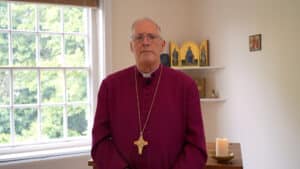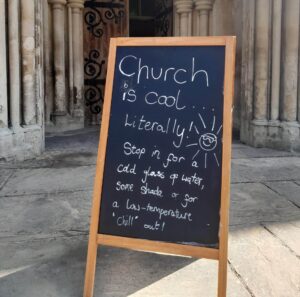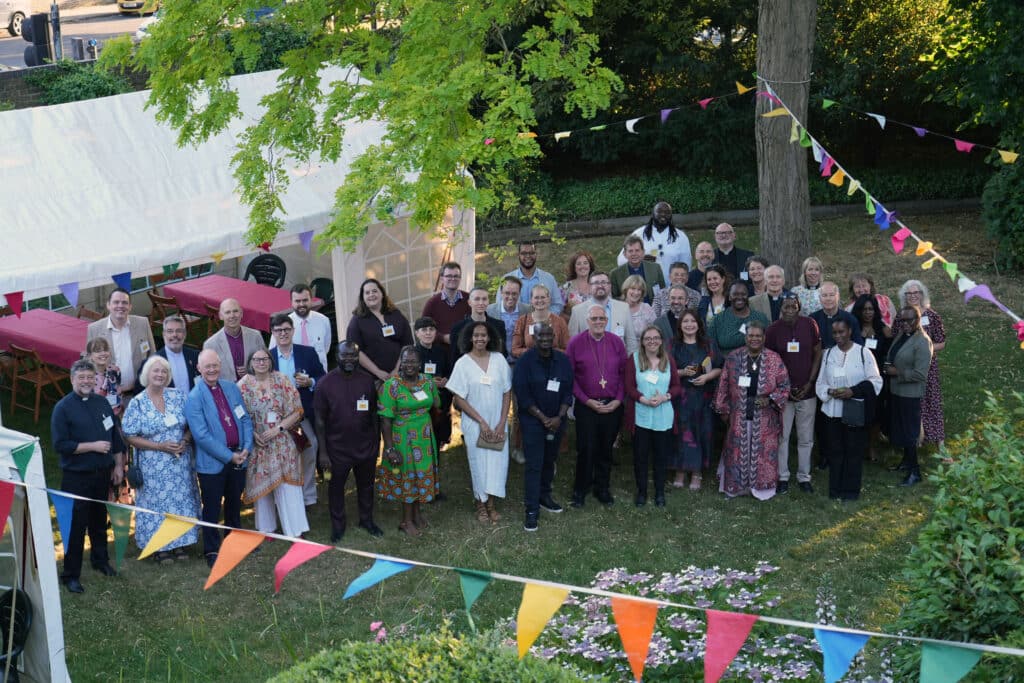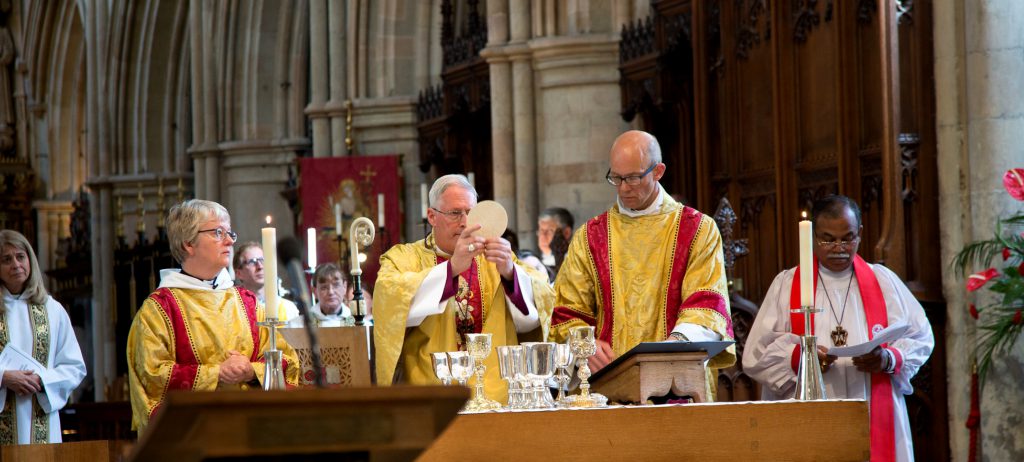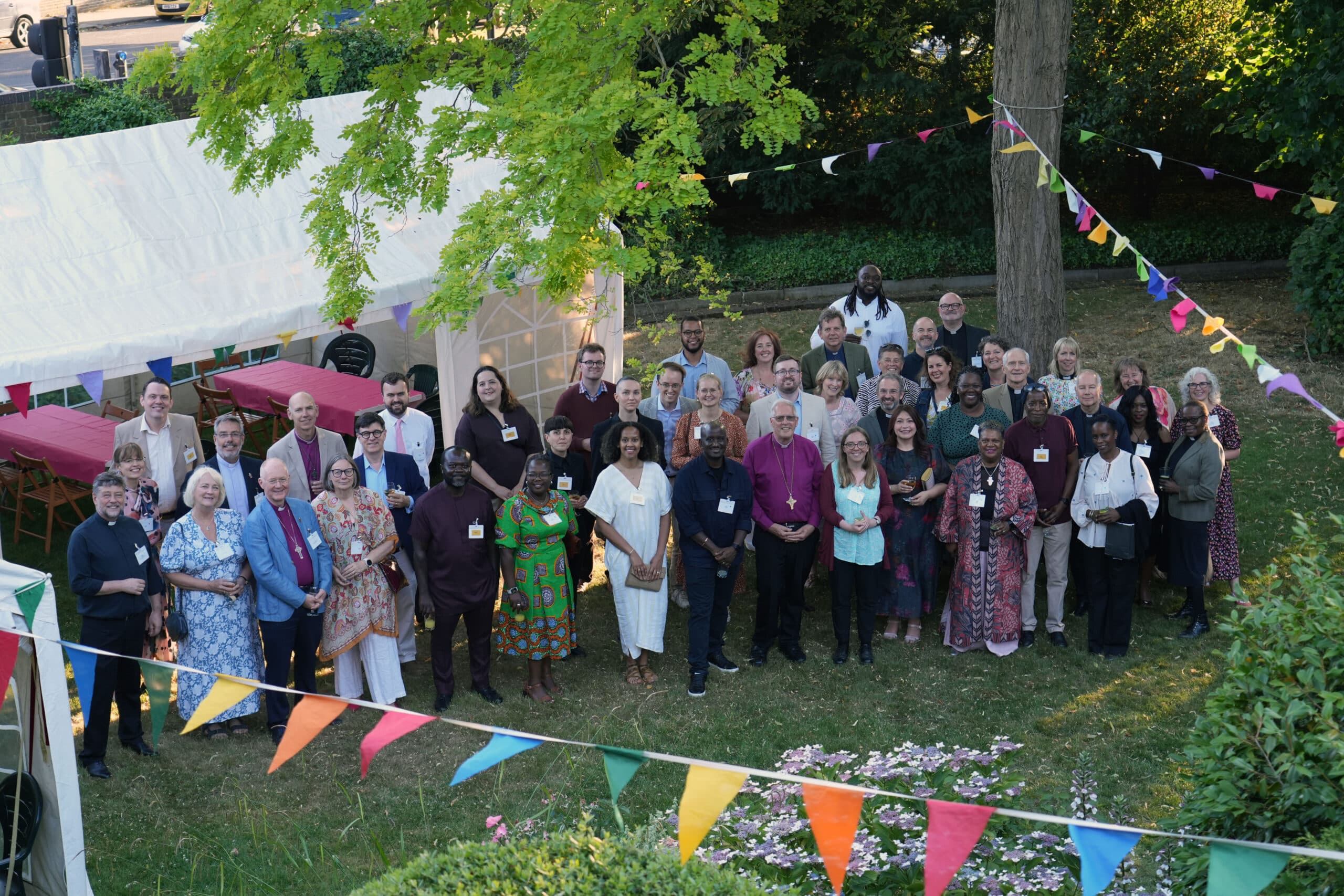It is very good that we are together today as a Synod to pray and to deliberate, and to conduct our business. On Monday I returned to London from a very blessed ecumenical pilgrimage to the Holy Land which I co-led with Bishop Paul Hendricks, the auxiliary Bishop of our brothers and sisters in the Roman Catholic Archdiocese of Southwark. We were supported by the Deans of the two Cathedrals and we were welcomed by the living stones of the Christian Churches in the Holy Land. Every visit to the Holy Land is special – but this pilgrimage holds a particular place in my heart because I and my fellow pilgrims, Anglican and Roman Catholic, were following in the steps of Jesus even though divided by history and confessional disciplines. On pilgrimage, we prayed together and together offered the Eucharist, each and every pilgrim longing for full eucharistic communion. Worshipping together, we sometimes used the Roman Catholic rite at the altar, and at other times the Church of England’s rite. Even though we were not all able to receive the sacrament because of our confessional disciplines, our worship was offered to almighty God in unity of spirit and with unity of purpose. I have no doubt our prayers rose together to the altars of heaven, even though the reality of our own disagreements meant we could not all partake of the bread and the wine at every Eucharist. But together we followed in the steps of the same Lord Jesus, offered worship to our same King, and were pilgrims in the land where he lived, taught and ministered, where – before he died and rose again to save each precious child of his – he prayed that his disciples ‘may all be one … so that the world may believe’ (John 17. 21). It was a blessed time indeed, and as we moved from Jerusalem to the Sea of Galilee via the Judaean wilderness and Jericho, Scripture, geography and the holy places of the three Abrahamic Faiths all impacted in powerful ways.
One of my responsibilities in the House of Bishops is to be the Lead Bishop for relations with the Oriental Orthodox Churches. This is a joyful task and I am very blessed by the abiding sense of fraternity that is present when I meet and work with my brothers in Christ, Angaelos, the Coptic Archbishop, and Hovakim, the Armenian Bishop, together with other brother Bishops of the Oriental Orthodox Churches here in the United Kingdom. We, too, know that we follow the same Lord and confess the same Christ. We know that that there are many years of history that divide us – yet we find ourselves talking and praying together, building relationships of trust and thanksgiving – which is almost incredible – since unlike the mere 489-year old breach between the Church of England and the Roman Catholic Church, the Oriental Orthodox Churches did not endorse the teachings of the Fourth Ecumenical Council held in 451 – that is to say 1,572 years ago. The Council of Chalcedon defined the fullness of our Lord’s human nature and the fullness of His divine nature. Is there anything that could be more significant than that?
I am reminded of this because both in the conversations around Living in Love and Faith and in those following the recent motion at February’s General Synod, approved by all three Houses, I have observed a certain renewed vigour when the word ‘orthodox’ has been deployed. Which is to say that it is used only as an adjective that can be applied to the speaker. I am orthodox because I hold certain views. We are orthodox because our group comprises people who agree with me. They – all those others – simply cannot be orthodox because their views diverge from mine. It is among the oldest temptations known to fallen humanity to speak like this: we offer right worship (for that is the meaning of orthodoxy) but the worship others offer is not right. I will return to this idea in a moment.
I have said before that Archbishop Rowan Williams charged me in 2011 ‘to encourage clergy and laity to engage with one another across respective expressions of Anglican faith; to nurture and value the gifts of all in the service of the mission of the Church embracing the openness the Diocese has to different traditions and perspectives’. I have not only taken these words to heart but sought to live by them. Yet even in a Diocese like Southwark that celebrates its glorious diversity, our conversations on sexuality have often been toxic. I therefore give thanks that over recent years we have worked hard to listen to each other and to speak well of each other, respecting different convictions held in good faith. The Church more widely has also made progress in seeking to affirm, accept and welcome all God’s people.
In reflecting over the years on the contested issues that have faced the Church of England, I realise how indebted I am personally to the work of Mary Tanner on open reception and I have returned to the Eames Commission and the Virginia and Windsor Reports, thankful for the settlement we have reached and thankful that women are now ordained to each of the three historic Orders. Reception is ‘a way of testing whether a controversial development arising within a province by legitimate processes, might gradually, over time, come to be accepted as an authentic development of the faith’ and enable a settlement (Windsor Report [2004], para. 68). In a church such as ours, shaped at the Reformation as it was in argument and conflict, reception is an important test. It is a principle that sets the boundaries of accommodation. For me as a Bishop that is particularly important. For while we are a reformed Church, and do not have a universal jurisdiction, we maintain Catholic order – and we have the joy and responsibility of sharing faith in Christ in common cause with our ecumenical partners – sister churches with whom we proclaim one Lord, one Faith, one Baptism.
I therefore caution against laying too much emphasis on our own orthodoxy – or to put it another way, laying too much emphasis on our own understanding as to whether we would characterise our positions as liberal or conservative. Mere labels! There are some theological disagreements that we simply have to live with – receiving or not receiving the Chalcedonian definition is one of them. At the 2008 Lambeth Conference, Metropolitan Kallistos Ware (of blessed memory, and who did accept the Chalcedonian definition in its fullness) referred to our issues of controversy and said: ‘your questions are our questions and if they are not, they will be’. We have in the Church of England embarked upon a genuine process of listening and learning about our differences in love and faith which has included discernment about the nature of a holy life for lesbian and gay Christians. We acknowledge and respect different convictions on what this looks like; but we are not at liberty to allow convictions held in good faith to slide towards poor behaviour. We cannot, because the test of orthodoxy is a life offered in the worship of God. If we want our own good faith convictions to be respected, we must offer the same to those who disagree with us. Whether we are Oriental Orthodox, Roman Catholic, Anglican, Pentecostal, Free Church, liberal, conservative, or some mix we cannot readily articulate, we walk together in pilgrimage following in the steps of Christ. This is our common witness and what I have learned through my commitment to ecumenical dialogue rejoicing in our claim to be just a part of the One, Holy, Catholic and Apostolic Church. And this came home to me again so powerfully in recent days while making a Lenten pilgrimage to the Holy Land.
Echoing the call that arose from the 1988 Lambeth Conference that the Communion should commit to an ‘open process of reception’ concerning the consecration of women to the episcopate (Eames Group Monitoring Report, August 1997), the Archbishop of Canterbury wrote to the Bishops of the Anglican Communion during last year’s Lambeth Conference and observed that some Provinces ‘have blessed and welcomed same-sex union/marriage, after careful theological reflection and a process of reception’. In the Provinces of Canterbury and York of which we are part, the House of Bishops has had a clear mind about not wishing to change the doctrine of Holy Matrimony. But it also reached consensus on offering a suite of liturgical resources for those in same-sex unions which will simply be available for use with no obligation to do so. This way forward has commended itself to all three House of our General Synod as work in progress. We have committed ourselves to ‘monitor[ing] the Church’s use of and response to the Prayers of Love and Faith’ and reporting back in five years. An open process of reception has helped us live together well in the past, keeping us engaged in dialogue and gives an honoured place and voice to our ecumenical partners as well as those holding conservative positions within our own church and the wider Communion. I wish to assure all those who might be harbouring concerns about our direction of travel that everyone is being honoured and respected by these proposals. No-one is being disenfranchised and our range of convictions on this matter is reflected at every level of Diocesan life, including among the episcopal team. I hope and pray that we may move forward together with a calm and thankful spirit, mindful of our common life in Christ Jesus our
Lord and Saviour. With God’s help, let us to go forward in good faith and mutual respect, open to the guidance of the Holy Spirit, and not saying to others who hold a different view, ‘I have no need of you’. We have a solemn duty to do this.
Almighty and everlasting God,
you hate nothing that you have made
and forgive the sins of all those who are penitent:
create and make in us new and contrite hearts
that we, worthily lamenting our sins
and acknowledging our wretchedness,
may receive from you, the God of all mercy,
perfect remission and forgiveness;
through Jesus Christ your Son our Lord,
who is alive and reigns with you,
in the unity of the Holy Spirit,
one God, now and for ever. Amen.






